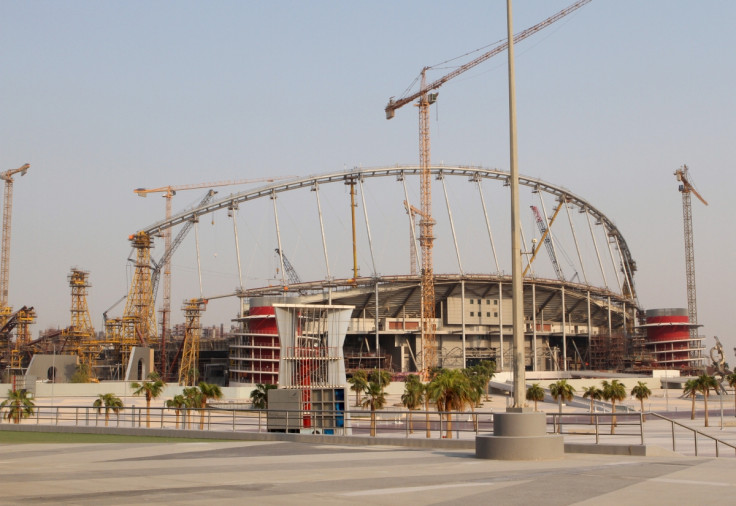Qatar 2022 World Cup: Amnesty criticises Fifa over 'appalling' abuse of migrant workers

Fifa has been accused of failing to prevent systemic and "appalling" treatment of migrant workers helping to build and renovate stadiums for the 2022 World Cup in Qatar. A damning 50-page report by Amnesty International says that construction staff working on the Khalifa International Stadium in Doha lived in squalid conditions, are unpaid for months on end and have their passports confiscated.
Amnesty also said it had uncovered evidence that the staff of one labour supply company used threats to force migrants to work including withholding pay, handing workers over to the police or stopping them from leaving Qatar. The human-rights organisation said this amounted to "forced labour" under international law.
The findings are based on interviews with 132 migrant workers involved in rebuilding the Khalifa stadium – set to host one of the semi-finals in 2022 – and with a further 99 migrants helping landscape green spaces surrounding the Aspire Zone sporting complex, where Bayern Munich, Everton and Paris Saint-Germain trained during the last winter.
All those interviewed, mostly from Bangladesh, India and Nepal, reported abuse of one kind or another. All but six complained they had been deceived as to what their job would entail and their pay before arriving. Migrant workers were also threatened for complaining about their conditions.
Salil Shetty, Amnesty's secretary general, called on Gianni Infantino, the new Fifa president, and the governing body's sponsors, to take action.
"The abuse of migrant workers is a stain on the conscience of world football," Shetty said. "For players and fans, a World Cup stadium is a place of dreams. For some of the workers who spoke to us, it can feel like a living nightmare.
"Despite five years of promises, Fifa has failed almost completely to stop the World Cup being built on human-rights abuses. Indebted, living in squalid camps in the desert, paid a pittance, the lot of migrant workers contrasts sharply to that of the top-flight footballers who will play in the stadium. All workers want are their rights: to be paid on time, leave the country if need be and be treated with dignity and respect."
"My life here is like a prison. The work is difficult, we worked for many hours in the hot sun."
Amnesty said Qatar's kafala sponsorship system, under which migrant workers cannot change jobs or leave the country without their employer's permission, has been a big problem despite promises of reform in late 2015. Some Nepali workers told Amnesty they were not even allowed to visit their loved ones after last year's earthquake that devastated their country.
Nabeel (name changed to protect identity), a metal worker from India who worked on the Khalifa stadium refurbishment, complained when he was not paid for several months but only received threats from his employer.
"He just shouted abuse at me and said that if I complained again I'd never leave the country," he said. "Ever since I have been careful not to complain about my salary or anything else. Of course, if I could I would change jobs or leave Qatar."
Deepak (name changed to protect identity), a metal worker from Nepal, added: "My life here is like a prison. The work is difficult, we worked for many hours in the hot sun. "When I first complained about my situation, soon after arriving in Qatar, the manager said 'if you [want to] complain you can but there will be consequences. If you want to stay in Qatar be quiet and keep working'."
This is the second report by Amnesty concerning the abuse of migrants working on Qatar's World Cup stadiums in less than four months. In December 2015, the organisation revealed similar findings following interviews with more than 400 migrant workers.
The latest allegations will yet again damage the reputation of Qatar's Supreme Committee for Delivery and Legacy, the organisation responsible for delivering the World Cup and which promised minimum standards would be met on the construction of stadiums. The number of people working on World Cup sites is set to surge almost tenfold to around 36,000 in the next two years.
Amnesty International is calling on major World Cup sponsors such as Adidas, Coca-Cola and McDonald's to pressure FIFA to address the exploitation of workers on the Khalifa stadium, and disclose its plan for preventing further abuses in World Cup projects.
Qatar's Supreme Committee accused Amnesty of painting a "misleading" picture. It said its report was limited to just four companies out of more than 40 currently engaged on the Khalifa Stadium, and that the allegations dated back to early 2015. Since then, it said three companies had been banned from World Cup projects until they make improvements, while another had undergone "a comprehensive rectification process".
"The conditions reported were not representative of the whole work force," said the Qatar statement. "We wholly reject any notion that Qatar is unfit to host the World Cup."
A statement published by Fifa also disagreed with the findings. Federico Addiechi, Fifa's head of sustainability, said: "We closely monitor developments and address issues through our regular contact with the Supreme Committee.
"We have also met with a number of key stakeholders to discuss the best way forward. Of course many challenges remain, but we are on the right track and committed to continue improving, to further contribute to the protection of workers' rights at the Fifa World Cup stadium projects."
© Copyright IBTimes 2024. All rights reserved.






